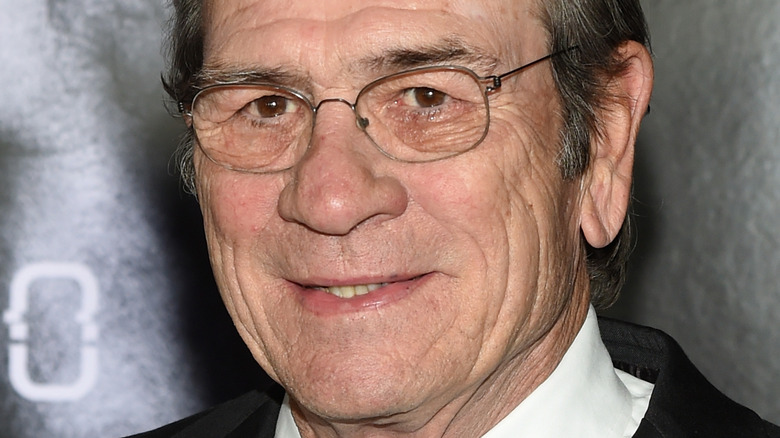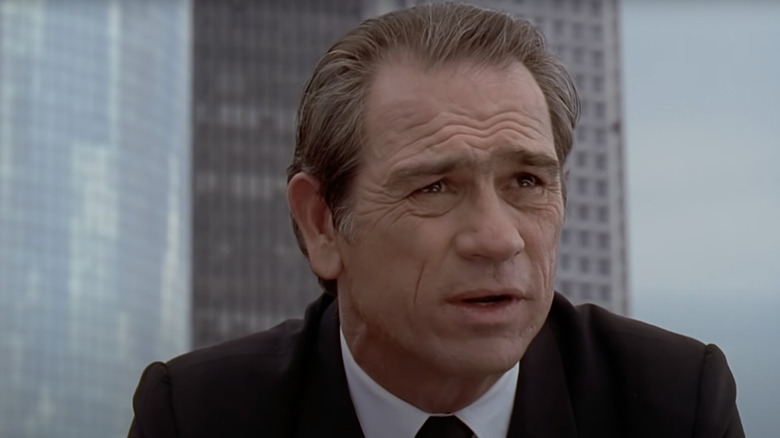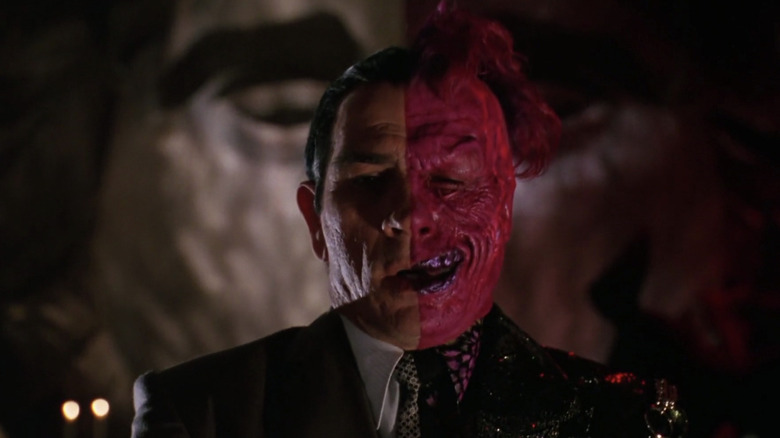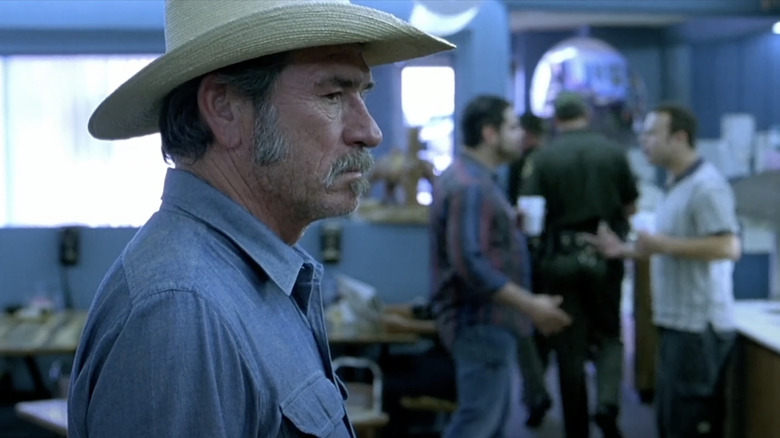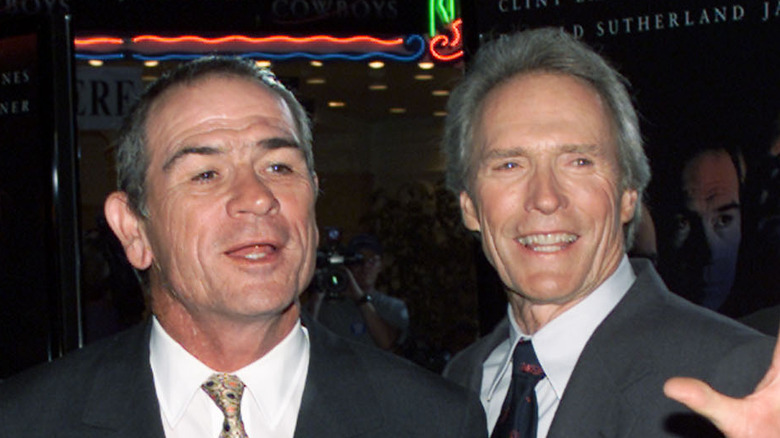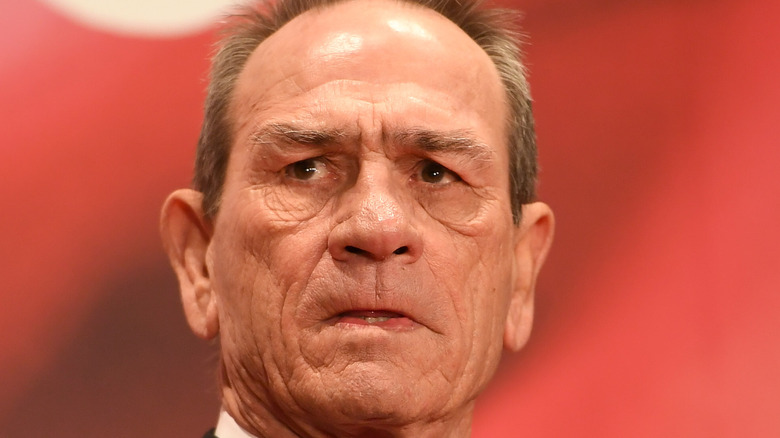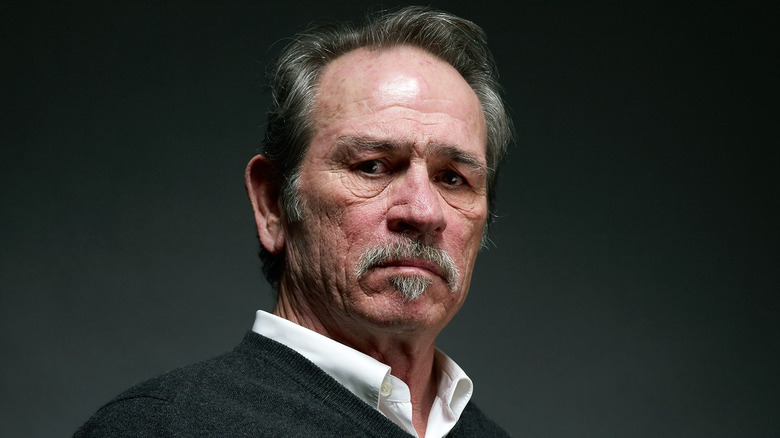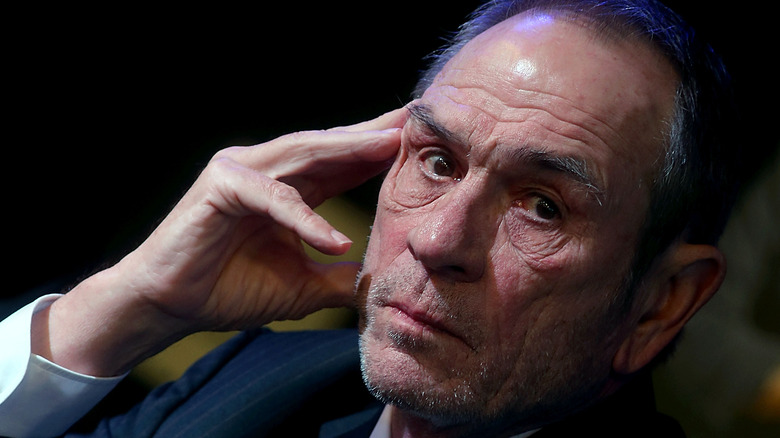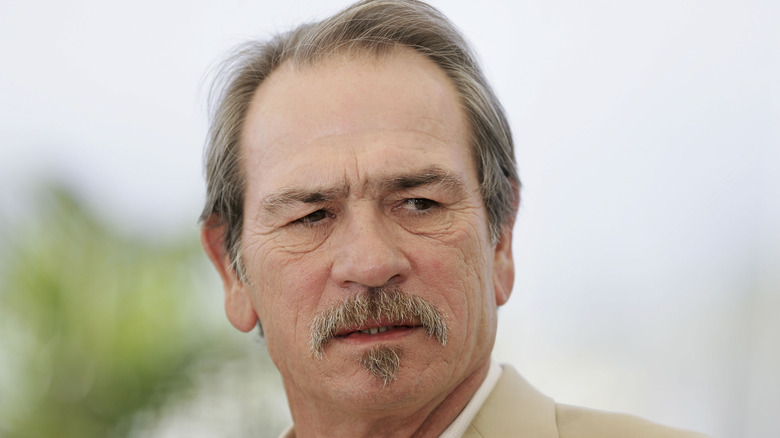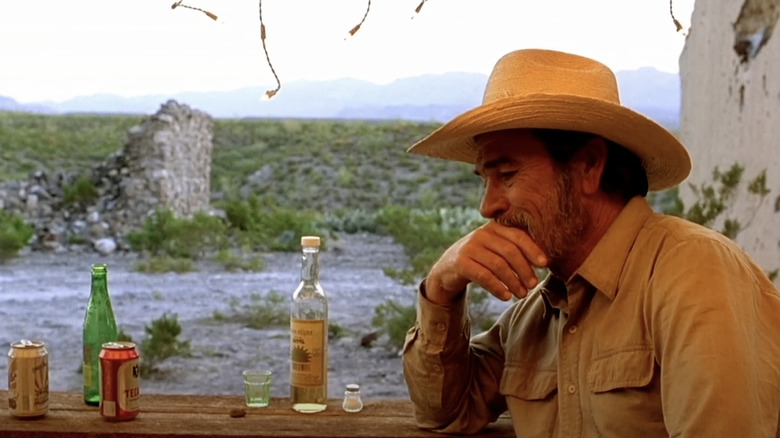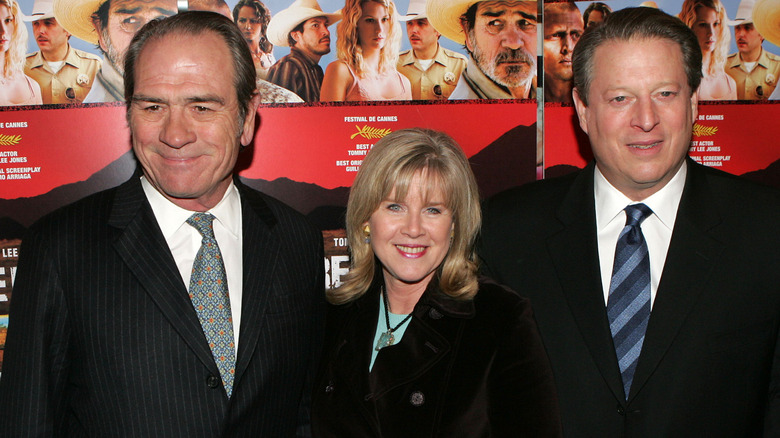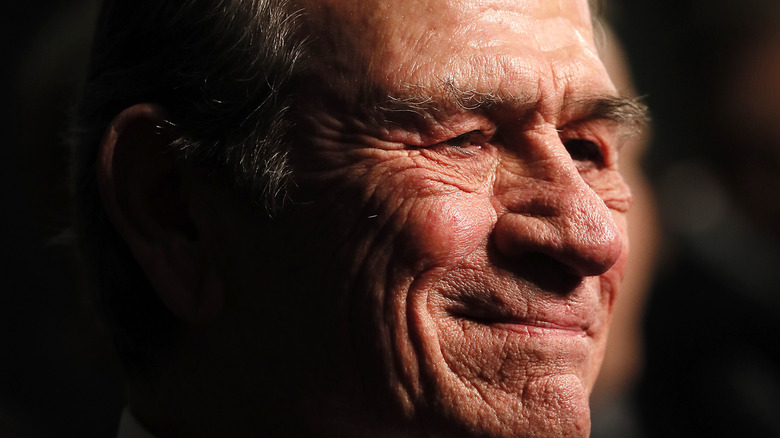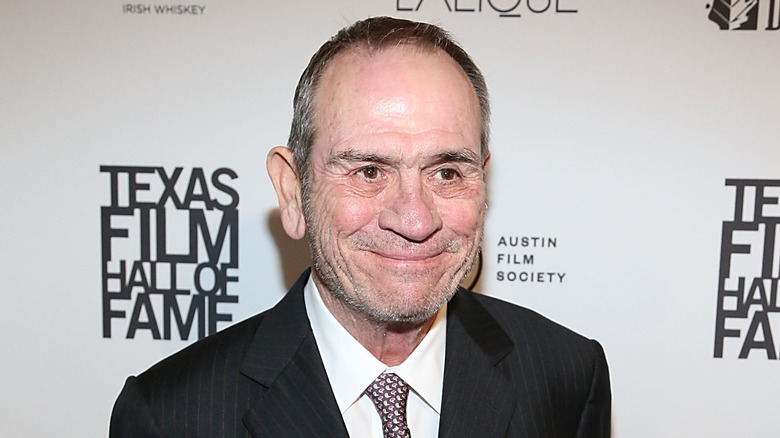The Untold Truth Of Tommy Lee Jones
Tommy Lee Jones has one of cinema's most distinctive faces. With his deep-set eyes and craggy features, Jones has rightfully achieved his place in film history as the legendary star of such films as "No Country for Old Men," "Men in Black," and "The Fugitive." In fact, Andrew Davis, director of "The Fugitive," once called Jones "the Southwestern Bogart" (via Texas Monthly).
The Oscar-winning actor has also earned a reputation for his frankness and steely demeanor. "But isn't that precisely why he's so appealing?" asked filmmaker Bill Witliff. He continued, telling Texas Monthly that Jones "has an intensity that's all his own ... You watch other actors on-screen, and you know they are having to invent their intensity. Tommy Lee does not." Steven Spielberg has also noted Jones' singular onscreen presence, telling the Los Angeles Times that "Tommy is not just a subtle solo instrument. There is an entire symphony orchestra inside that man."
From his comedic turn in the "Men in Black" franchise to his somber Texas-based directorial efforts, here are a few truths you may not know about Tommy Lee Jones.
He wasn't comfortable in his Men in Black role
While Tommy Lee Jones' role as "Agent K" in the "Men in Black" franchise is arguably his best known, it wasn't an intuitive fit for the generally more serious actor. However, director Barry Sonnenfeld wanted Jones from the start, recalling that, as soon as he finished the script, he turned to his wife and said, "Tommy Lee Jones” (via Inverse). But playing the straight man didn't come naturally to Jones. "It took a long time for him to feel comfortable with it," Sonnenfeld told Insider. "I don't think he understood that comedy."
According to the production staff of "Men in Black," it was clear that Jones wasn't sure that the film was going in the right direction, and wanted to be more overtly comedic. "It was my experience that if he knew it was a comedy he certainly didn't think it was funny — and he let me know on quite a few occasions," screenwriter Ed Solomon told Insider, though he also acknowledged that Jones' performance "upgraded the script in a pretty significant way."
In the end, Tommy Lee Jones' acting abilities won out, helping to make the film a success. Sonnenfeld told Insider that, in the end, Jones loved his performance, and would say in interviews, "The secret to being funny is to stand next to Will Smith and to do whatever Barry Sonnenfeld tells you to do."
He did not get along with Jim Carrey in Batman Forever
While Tommy Lee Jones is known for having a gruff, blunt manner, he was apparently much more combative while making "Batman Forever." Late director Joel Schumacher told Express that he called Jones a less than complimentary epithet in the pages of People magazine, adding, "He was not kind to Jim Carrey when we were making 'Batman Forever.'"
In 2017, Jim Carrey expounded on his experience when he was a guest on "Norm Macdonald Life." Carrey recalled that, during the shoot, he approached Jones in a restaurant. "He went to hug me and he said, 'I hate you. I really don't like you,'" said Carrey (via The Hollywood Reporter). "And I said 'What's the problem?' and pulled up a chair, which probably wasn't smart. And he said, 'I cannot sanction your buffoonery.'" Carrey guessed that Jones was uncomfortable with the genre, or that perhaps he didn't like that Carrey, as the hot new star, drew so much attention.
Schumacher was less understanding than Carrey, telling Express, "He did not act towards Jim the way an Oscar winner with a star on Hollywood Boulevard — being the oldest member of the cast, and having such a distinguished career and the accolades to go with it — should have acted towards Jim."
He's an award-winning director
Tommy Lee Jones is best known for his work as an actor, but he has also worked on-and-off as a director since 1995, when he directed "The Good Old Boys" for TNT. He also starred in the film, along with Matt Damon, Sissy Spacek, and Frances McDormand. Jones knew he was an unproven director, so he saw his opportunity when producer Edgar Scherick approached him about acting in the project. "I said, 'Look, Edgar, you really can't afford me,'" Jones told The New York Times. "'But if you will go with me to the marketplace in my pursuit of a directing job, I will deliver an expensive actor cheap.'"
Jones felt prepared to take on the role of director after observing a number of the filmmakers he's worked with on the set. "Over the years, I've made a very careful study of lenses and film stocks and lighting and rehearsal techniques," he told The Telegraph. Jones went on to direct the 2005 film "The Three Burials of Melquiades Estrada," which premiered at the Cannes Film Festival, as well as "The Sunset Limited" for HBO and "The Homesman."
"There are directors with so little self-confidence that they'll do 20 takes," Jones told The New Yorker in 2008. "Some directors are scared to death of actors — they wouldn't be directors in the first place if they weren't control freaks. I am my favorite director."
Clint Eastwood is one of his heroes
Tommy Lee Jones could never be called effusive, but he comes pretty close when he speaks of fellow actor-director Clint Eastwood. "I admire everything Clint Eastwood does," Jones told The New York Times in 2014. "I like the way he runs a set. I could sit at his feet and watch him work all day. Which I have done," he added. Jones was referring to the production of "Space Cowboys," an Eastwood-directed film in which Jones starred alongside his idol. In the same interview, he also said that "Unforgiven" is one of his favorite films, explaining that it delves into important ideas while remaining exciting to watch.
Jones' admiration for Eastwood doesn't end at filmmaking, but extends to who Eastwood is as a person. "I admire his approach to cinema, his way of working, his leadership qualities, his relaxed sense of humor, his authority," he told The Independent. While Jones is known to be a bit of a maverick, he is not shy in saying that Eastwood is someone he'd like to emulate. Overall, as Jones told The New York Times, "If I had a list of heroes, Clint would be on that list."
He's known for his prickly manner
Tommy Lee Jones has played many characters that are similar to him in personality. He's known to be a bit terse, stoic, and tight-lipped. Michael Black, who was once Jones' agent at ICM, told The New York Times that Jones is not the kind of person to share his personal history with just anyone he meets: "Tommy doesn't do that. He's private."
That privacy, however, doesn't translate well when doing press and publicity. Amongst entertainment journalists, Jones is a notorious interview subject. In a New York Times interview, Jones objected to a line of questioning (about having played many villains) by saying, "I find this entire subject, you know, just very uncomfortable and borderline stupid." In a more humorous exchange, Jones responded to a question asking him to clarify what "kind of English" he studied at Harvard by saying "The kind we're using now." Obviously, these were not the types of answers the interviewer was searching for.
For those closer to Jones, his bluntness and mannerisms are less irritating than an indicator of his upbringing. "You just need to remember that Tommy's got a lot of cowboy in him," actor Richard Jones told Texas Monthly. "He's got a cowboy's skepticism about people he doesn't know." In other words, Jones' prickly nature, dry humor, and blunt honesty are more related to his cultural background as a taciturn Texan than to unfriendliness.
He has a cattle ranch in Texas
After establishing himself as an actor in the film industry, Tommy Lee Jones moved back to his native Texas, where he has a large cattle ranch in San Saba, north of San Antonio (via the New York Times). Jones works the ranch, and has showcased his skills onscreen by performing the riding and roping in his own films, such as "The Good Old Boys" (via NYT).
Jones relishes the hard work the ranch provides, and in the summers will spend the entire day out with the cattle (via Texas Monthly). He acknowledges that some might find the landscape to be harsh and hard to navigate. "It can be a hostile country," he told The Telegraph. "There's nothing living in those mountains that won't sting or bite or stab you ... If you disrespect the country, it will cripple you." But Jones loves his home, and also finds joy in it. As well as being a cattle herder, he's an avid polo player, and will play polo matches with his children and friends in the evening after a hard day's work (via Texas Monthly).
He's a Harvard grad
Tommy Lee Jones was born in San Saba, Texas, where his father was an oil field worker. While he came from a very blue-collar background, Jones distinguished himself very early on, when he began attending an elite prep school in Dallas after receiving a sports scholarship (via Texas Monthly). From the prep school, he was accepted into Harvard, where he played football and acted in plays (written by greats like Brecht and Pinter) while majoring in English. He graduated cum laude (via The New York Times).
While Jones' terse cowboy persona doesn't immediately match the stereotyped images of preppy, intellectual Harvard, he bristles at the idea that he was out of place there. "If you're saying, Tommy Lee, you don't fit the image of the East Coast, social elitist wealthy people who comprise Harvard, the only thing I can say is you have no idea what comprises Harvard," he told The New York Times.
Texas is a major part of his films
Three of the four films that Tommy Lee Jones has written and directed have one important thing in common: Texas. "The location, language, rhythm, clothes, texture of cloth, light — mainly light — is something I know and care about," Jones told The New York Times in 1995. "Those were the origins of my creative thinking, so my creativity tends to be connected to place." The only exception is "The Sunset Limited," which Jones directed for HBO and adapted from a play written by Jones' good friend and fellow Texan Cormac McCarthy. Jones says that his impulse to make films about his home state is natural. "Anyone who wants to be an artist makes work about where he lives," he told The New York Times in 2014.
Upon the release of "The Three Burials of Melquiades Estrada," many critics and journalists saw a political bent to the film, as it deals with crossing the U.S.-Mexico border. But for Jones, the film was less about politics than it was about place. "I wanted to give people a glimpse of a world that has its own character, its own quality, its own struggles and disappointments," he told Texas Monthly, adding that he wanted to examine the differences and similarities in life and the land on both sides of the border.
He (almost) fired his daughter from one of his films
When directing "The Three Burials of Melquiades Estrada," Tommy Lee Jones involved his family in the production. He brought his wife Dawn Laurel-Jones, who he's been married to since 2001, to be the on-set photographer, while his daughter Victoria played a young Mexican girl in the film. "She's a good actress, has her SAG card, speaks impeccable Spanish," Jones told The New Yorker. "But I fired my daughter. She had to get up at 5 A.M. for her part. One morning, she wouldn't get out of bed. I said, 'Honey, this is work.' But she wouldn't budge. So I fired her." Luckily for Victoria, the other production staff were not so strict: they got her up and moving in time for her scenes, which do appear in the final film.
Jones has expressed interest in continuing to work with his children. A longstanding dream of his has been to adapt the Hemingway story "Islands in the Stream" and collaborate on the screenplay with his son Austin.
He's good friends with Al Gore
While attending Harvard, Tommy Lee Jones had a roommate with whom he forged a lifelong friendship: Al Gore. And while Jones has otherwise remained out of politics, he campaigned for Clinton and Gore in 1996 (via the New York Times). In 2000, he presented the nominating speech for Gore at the Democratic National Convention, saying, "Al's the closest thing I've had to a brother" (via The Independent).
Since then, Jones and Gore have worked together on initiatives for the environment, mostly with the Climate Reality Project, which was started by the former vice president. "I think any thinking person should be worried about climate change," Jones once said (via The Guardian). Jones and his wife even went to Antarctica with the group. There, Dawn Laurel-Jones worked as a photographer, capturing images of the thawing ice at the bottom of the world. "They're very beautiful pictures," Jones recalled when speaking to The Independent. "She sold 17 and that brought in a little over $401,000 to support this organization that we actually are a part of."
He despises labels
Throughout the many interviews Tommy Lee Jones has given during his career, he has made one thing very clear: he does not want to be labeled. "I would object to any moniker," he told The Guardian. When he got a writer from The Independent to admit he made a generalization, Jones said, "That's what I wanted to hear you say. You can leave me out of the generalization." Essentially, Jones doesn't like stripping anything or anyone of its complexity.
For many directors, Jones' insistence on avoiding easy labels and stereotypes is a big part of what makes him such a compelling actor. Andrew Davis, director of "The Fugitive," said of Jones to The New York Times, "The thing he fights is cliches ... Whether it's a terrorist or the marshal, he wants it to be more theatrical, more alive than you would traditionally think of." This is certainly what makes Jones compelling to an audience as well. While he's a character actor, his characters are always much more than templates or archetypes. Instead, they are fully dimensional human beings.
He's passionate about literature
Tommy Lee Jones studied English literature at Harvard, where he wrote his thesis on Catholicism in the work of Flannery O'Connor (via The Guardian). His love of literature continues to influence his work, as he's made efforts to adapt Hemingway's "Islands in the Stream" for his next film as a director (via The New Yorker).
Jones is also good friends with fellow Texan Cormac McCarthy, and has even appeared in an adaptation of McCarthy's work: "No Country for Old Men." "Cormac's language is perfect," Jones told The Telegraph. "He is in my view the greatest living American prose stylist." However, aside from "No Country," Jones says that McCarthy hasn't "been served very well by the movies so far" (via The Guardian).
Jones has great reverence for the books he loves. Director Andrew Davis once told the Santa Barbara Independent about a time he approached Jones with a potential adaptation: "I had this script I wanted to do with him, a version of 'Don Quixote,' so I sent it to him and he wouldn't do it because it cut out so much of the book. He said, 'You don't f*** with Cervantes.'"
